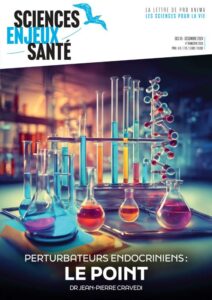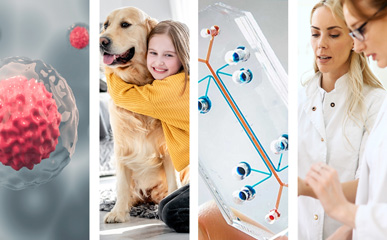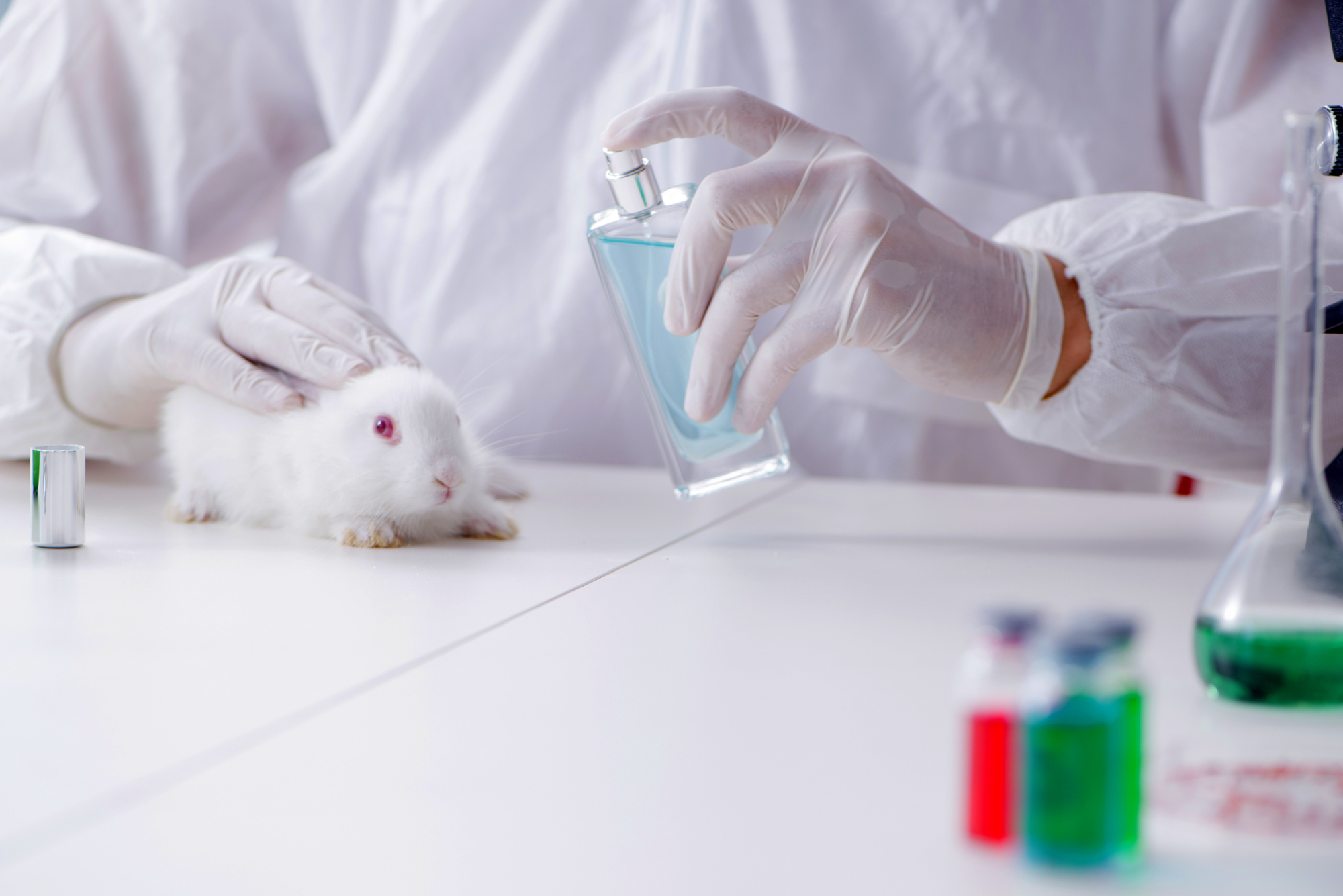
MEPs Tilly Metz & Caroline Roose
Two committed members for non-animal research
SES110 — Sept. 2023With complementary profiles, Caroline Roose is driven by his love of nature and the oceans, defending body and soul the great forgotten animal welfare, fish, while Tilly Metz, who works and promotes the concept of One Health, heads on to rethink our system and our relationships with the living world.
We had the honour and pleasure of talking with these incredible, passionate women and MEPs, whose watchword is “not to give up” for animals, human beings and the planet. We let you discover the joint interview of these two women who decided to give their time and energy to change mentalities and transform our societies.
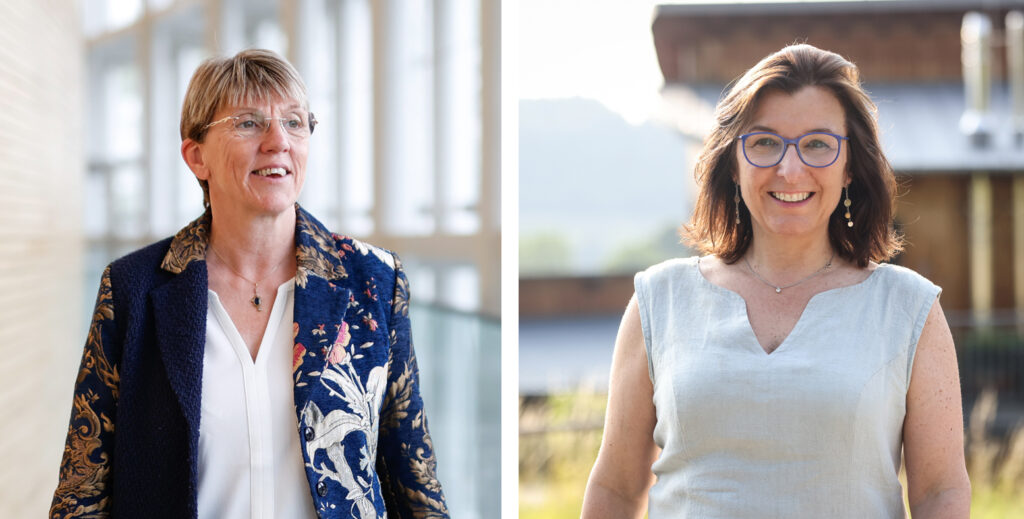
Caroline Roose – Tilly Metz, MEPs, The Greens / EFA
Comité scientifique Pro Anima : For our readers, can you introduce yourself in a few words and explain to us what has pushed you to get involved in politics and more particularly at a European level ?
Caroline Roose : Born in Belgium, I live in France, I am thus elected for a French delegation.
This is my first mandate as a Member of the European Parliament and even my first mandate at all.
I am a member of the Greens / EFA and have been active in the associative environment for many years.
I was a part of the “Blouses roses” in the hospital sector for sick children. I also spent a lot of time in animal shelters. My father once brought us an abandoned dog and it started like that. Since then, I have given of my time in protests, like against dolphinariums and bullfighting, for the protection of the environment and more particularly of the oceans. Indeed, I grew up with the sea. My father and my husband were sailors ; I myself was an embarked sailor. Protecting the oceans means a lot to me and is reflected in my mandate particularly in my relationship with the European Parliament’s Committee on Fisheries. The great forgotten of well-being animal for me today is fish. When we talk about fish, we talk about quota, tons but no subjects. They are just goods and, this is for me an aberration.
Tilly Metz : I was born in Luxembourg City. I have been a member of the environmentalist party the Greens since 2001, and for which I was the spokesperson. I was mayor from 2005 to 2011 of a small municipality and a municipal councilor of Luxembourg city. Since July 2018, I have been a member of the European Parliament, re-elected in May 2019.
I was president of the Commission of Inquiry into the Protection of Animals during Transport (ANIT).
It was the very first commission dedicated 100% animal welfare. Having the honour of being able to chair this committee was really important for me, and even my greatest pride, if I can say so, in my career here in the European Parliament. I am also president of the Animal Welfare Intergroup, which brings together parlementarians interested in this cause, including Caroline, who is the vice-president. We are the second largest intergroup in Parliament in terms of size. We also have an Animal in Science working group that I have also chaired.
So, with the priority of animal welfare, and animals in science, one of my other absolute priorities is everything that revolves around health and the concept of One Health, a holistic approach to health.
It really is par excellence an area where these subjects come together. And one of my battles in the field is certainly to finally get away from animal experimentation and make it a political priority, since today, and increasingly, there are alternatives.
Pro Anima : In your opinion, what are the main obstacles to the transition to non-animal research ? What action levers do you identify as being the most relevant to overcome these obstacles ? Could there be more in the near future ?
“We need all stakeholders. We need lobbies, laboratory workers, everyone around the table to discuss this transition towards innovation without the use of animals and to explain that this is possible.”
Caroline Roose
Caroline Roose : There is the weight of lobbies, which is terrible for me and represents a real blockage. This is not unique to the subject of scientific innovation and animal testing. It’s the same in other committees. But on this subject, the power of pharmaceutical lobbies is indeed significant. I remember, I wrote a letter to the flight company, Air France, to request the end of the transport of primates. The answer did not come from Air France, but I received responses from the labs directly who knew that I had written.
However, I think we need to go beyond that. We need all stakeholders. We need lobbies, laboratory workers, everyone around the table to discuss this transition towards innovation without the use of animals and to explain that this is possible. We need to talk together and I think we will be able to move forward much faster.
In the future, I would like future laboratory technicians to be trained directly in alternative methods first, because this is not the case today. They are trained with the use of animals, which notably creates automatisms. And this is problematic. It is possible to generate funding precisely to train laboratory workers first to alternative methods. We unlock funds for many other subjects ; we can have funds for this. It is possible and it must be done. There are so many subjects on animal welfare, there should also be a lot more and we should have a committee dedicated to this subject. It would change a lot of things, as well as a dedicated budget, and not dependent on that of the environment.
Tilly Metz : It is a matter of funding and political coherence. The primary obstacle is clearly the funding. But I think that the most important thing is also in people’s minds, in mentalities and knowledge. I think for many scientists, the tradition of doing tests on animals is so rooted that they have difficulty imagining research and a science without tests on animals. In fact, there is the problem of what we learn at university and what is disseminated. We must do even more, training in the studies of future researchers, but also information sessions for other actors, as I was able to organize recently for assistants. It is necessary to give a lot more space for the training and knowledge of these alternatives that exist.
So financing, training and change of mindset. And there are also temporal, economic, efficiency and transferability reasons for investing much more heavily in alternatives. We know that most animal tests are not transferable. When we think of Alzheimer’s, Parkinson’s and other pathologies.
Our life as human beings is so much more complex and depends a lot on our lifestyle. We aren’t 70 kilo rats.
And I am also convinced that having an animal health and welfare commissioner, 100% clearly dedicated to this, both in the title and responsibilities, could be one of the levers. I think that now we have arrived at a moment where we must say to ourselves that we have alternatives, we must move on to something else. A society that wants to be civilized must question itself about the way in which it behaves in relation to all the others living beings with whom we share the planet. It is in this sense that I develop this One Health approach, a global approach to health, which is crucial. This is indeed also the way in which diseases develop in animals, the way we treats other living beings. All this also has a consequence on human health.
Pro Anima : PA : The vote in 2021 by the European Parliament almost unanimously in favour of accelerating innovation without the use of animals is a strong sign, but also sent to the European Commission. While the European Parliament, in its resolution, recognized obstacles, particularly bureaucratic, in the development of non-animal methods, does the European Commission seem ready to participate more concretely in this acceleration ?
Caroline Roose : Within the commission, at the level of my mandate, we had debates in plenary ; something that apparently was not done before. Then, it is true that with certain political groups at the level of debates, it is not yet that. For example, on the last debate concerning animal experimentation, I had a little difficulty with everyone’s positions, but we still manage to unite, which is for me of capital importance. The last debate asked the Commission to have a roadmap.
Today, there is nothing binding, as in many directives unfortunately. This is why the European Parliament must continue to put pressure on the European Commission to obtain this roadmap and have a more binding impact on Member States.
“There are even areas where research is blocked by remaining focused on animal testing, breast cancer for example. We would make better progress in research and disease if we used alternative methods.”
Tilly Metz
Tilly Metz : Honestly, I would not have believed that we would have had such support from Parliament and I would even say I had tears in my eyes, I was super happy. With this resolution, which clearly mentions again the abolition of animal tests, concrete actions must now follow. I’m a little fed up that, for various reasons, we support words, we say yes it’s true, it’s cruel, but when we actually come back to concrete actions to get rid of animal tests, it becomes much more complicated. Let us be consistent with the 2010 Directive, which very clearly mentions not only the 3Rs, but as ultimate objective the end of animal testing.
So is the Commission ready ? Through words, yes. But they need a lot of pressure, because in the meantime, millions of animals are used each year for scientific purposes. There are even areas where research is blocked by remaining focused on animal testing, breast cancer for example. We would make better progress in research and disease if we used alternative methods.
Another example, the development of antibodies for which we would not need to use animals, or diseases like Alzheimer’s, which animals do not develop naturally, and which we create for them artificially. However, it would be easy to take stock of the situation. We have guidelines that already exist, developed by the Commission, for alternative tests without animals. It should now make it a real political priority, and say consistently where we can replace it right away, what are the steps for the sectors where it is necessary to exit gradually, and those where we still seem to have perhaps few alternatives.
This is also a matter of credibility for the European institutions. People are waiting for us on this.
PA : Given these gaps/weaknesses (absence of a roadmap, deadlines, non-binding effects for Member States, etc.), would a revision of European Directive 2010/63/EU not be necessary/relevant ? ? If not, could other legal tools be used or should they emerge ?
Caroline Roose : We need this European directive, which exists today, to already be applied.
Because I still have a fear. This directive is certainly not extraordinary, but we have it and it has the merit of existing. If we reopen it, what will be left ? Aren’t we going to remove things, which are more or less restrictive despite everything ? Reopening a text is always complicated. It is for this reason that the priority is to push for this to be more binding at the level of the Member States through this roadmap from the Commission. But I think we’ll get there and we won’t give up, that’s for sure.
Tilly Metz : From my perspective, it would still be interesting to review it. I am not saying that this directive is bad, since the 3Rs and the exit from animal testing are clearly mentioned, along with other very valid elements. And everything should not be called into question. When I see certain developments in Europe, which do not go in the direction of greater protection for the environment and animals, although being optimistic in nature, it is true that I am still worried. There is always a risk, if we open a directive, of ending up with a less good text.
But if you ask me, if I were now a commissioner, I would say yes, we would revise it. The text will be 14 years old during the next legislature. However, I would make it clearer. Why not put this roadmap with very precise objectives in the directive, so that it has even more strength. The regulations and legislative texts at European level are clear ; it’s easier for everyone. Companies in general tell us “Give us clear rules, so we can adapt”. This applies in other sectors.

Credit : Tilly Metz
PA : Would you like to continue your missions within the European Parliament for the years to come ? If not, in what form would you like to be able to continue your commitments ?
Caroline Roose : Yes, I would like to continue doing what I love most and defend animals. And I would like to do more. In terms of animal welfare, the year 2024 will be very important and even pivotal. So I applied, we are working with my party. My application was received and accepted and for the moment I am seventh on the list. Afterwards, I cross my fingers because I am not declaring victory upstream, but I hope to be there in 2024 and continue to fight for the animals. There is a review of animal welfare legislation and all these ICEs in progress.
There are a lot of things to do. I was again in front of Marineland this weekend (July 16 – 17, 2023) protesting against those parks with cetaceans. We see that things are starting to move, whether for fur, for animal testing, for the shark fin trade, all aberrations. We must continue to work like this with the European Commission. By explaining things, we see the importance of the subject ; it is transversal. It affects all sectors. And we shouldn’t stop talking about it because not everyone is aware of everything that’s going on. We have to get to the point where one day we no longer use animals at all. An animal is not an object ; it is a living being that is sensitive.
Tilly Metz : Very clearly, yes. My party must support me. Obviously, voters must also see it like that. But I would fight to be able to continue to engage at European level, especially when I think of the animal cause, because there is the revision of many texts on which I would like to work and the subjects that we have addressed together on the animals in science. This is something that pains me a lot. There are still so many battles to fight.
PA : We know you are both close to each other and share essential battles for our future. You were among the most active and committed MEPs to support the 2021 Parliament resolution, but also the ICE Save Cruelty-Free Cosmetics, and thus the entire dialogue with the Commission. We imagine your valuable collaboration ?
Caroline Roose : With Tilly, it is teamwork. We went on field missions quite a few times for the Commission of Inquiry on the Protection of Animals during Transport, where we slept in the cars. We have the same sensitivity and we complement each other. I would like Tilly to be there in the next mandate as well and that we could continue to work together because we worked very well throughout this term. It is strength to be able to stick together, to be able to give each other an opinion when she or I are on the spot alone, but also have additional ideas. It brings us together and strengthens us even more. That’s it, I think, temperament to not give up.
Tilly Metz : Caroline is a very important ally, whom I appreciate very much, especially she who defends the seas and oceans and aquatic life a lot. We have a very nice cooperation together. We have a lot of common fights like bullfighting for example, or protecting sharks. We are valuable allies and I hope that we will both be there again after the elections in 2024. Because there are certain people who put on “an animal welfare coat”, but who very quickly, once elected, forget that. And Caroline is not one of those. There is a consistent commitment. And we definitely need people like that in Parliament.
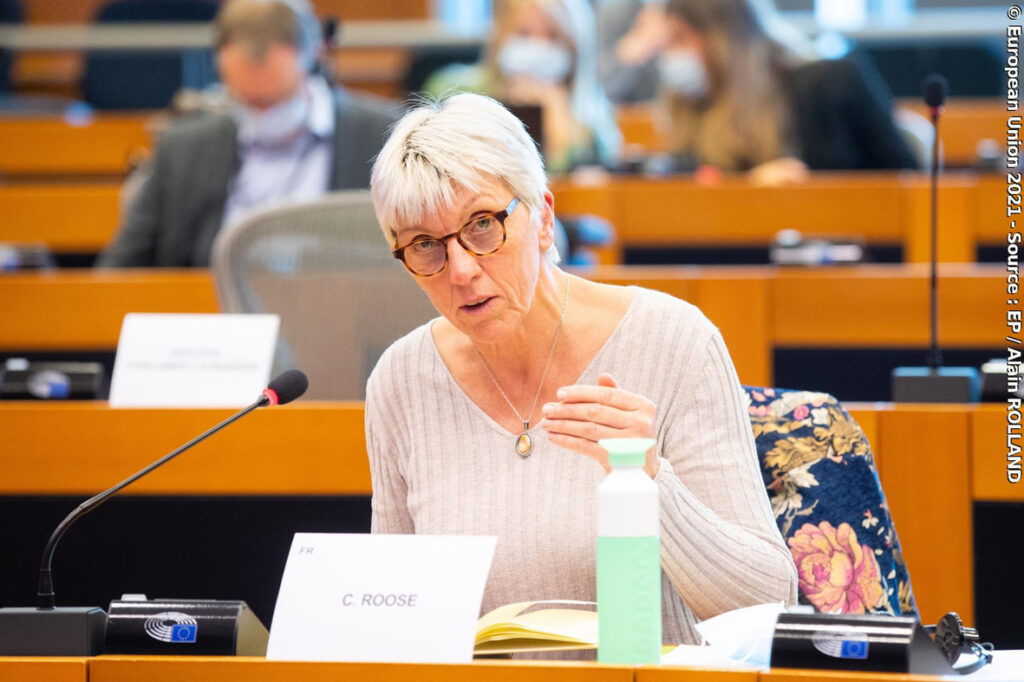
Credit : Caroline Roose

